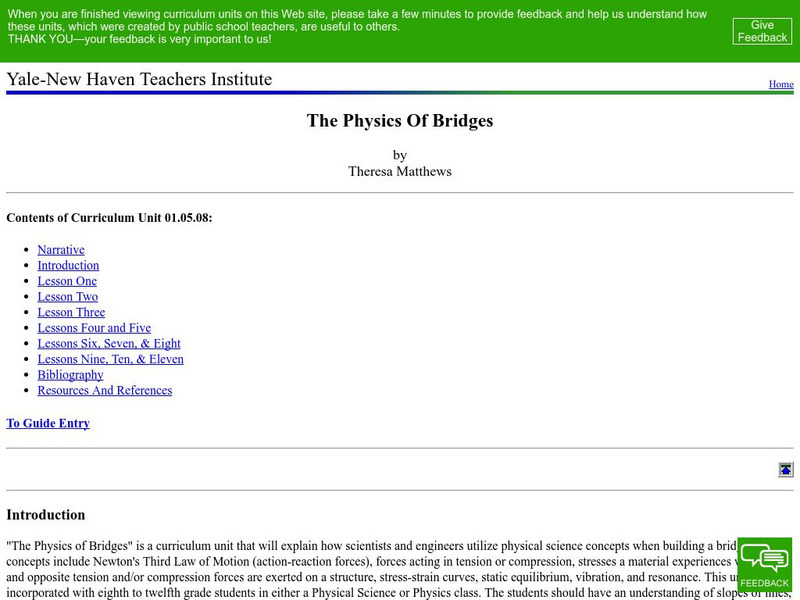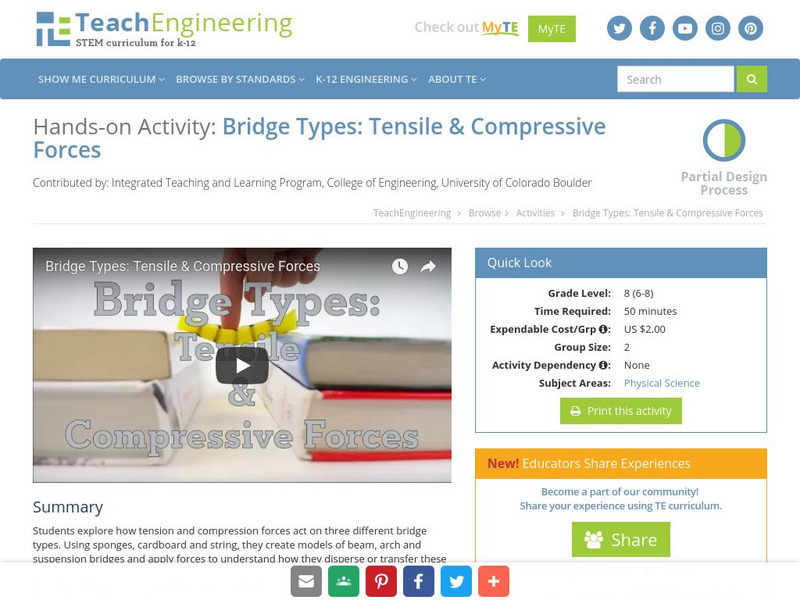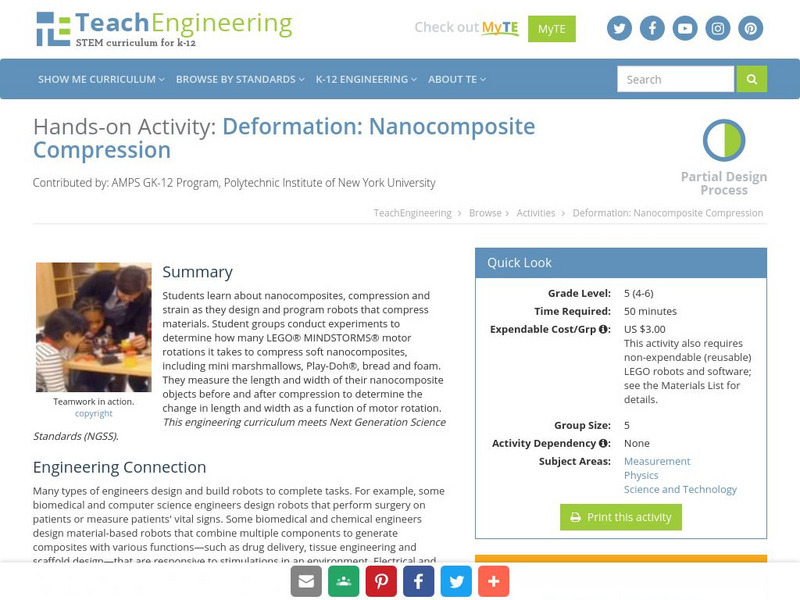Curated OER
Be a Structural Engineer!
Students investigate how to design and build items with a focus on structural strength as an engineer would. They complete a truss-building project as a final assessment.
Curated OER
Forces Inside the Earth
In this faults worksheet, students identify the three types of faults and the characteristics that define a normal fault, reverse fault, and a strike-slip fault. This worksheet has 3 fill in the blank and 3 short answer questions.
Curated OER
Sound and Hearing
In this sounds instructional activity, students will review how sound is created by vibrations. Students will understand what creates vibrations and how the ear receives those sound waves. This instructional activity has 10 fill in the...
Curated OER
Mathematics of Image Processing Project
In this image processing worksheet, students complete 4 steps related to image processing. First, they work in teams of 2-3 and create a hard copy report and documented m-files. Then, students try compression at various quality levels...
Curated OER
Rate Distortion
In this rate distortion worksheet, students solve 4 different sets of problems that include defining the rate distortion curve in various situations. They construct a rate distortion curve by plotting and angle against a particular line...
Curated OER
Suspension Bridges
Students view examples of suspension bridges and discuss their structure. They complete a tension and compression experiment with a partner then perform a similar experiment with books. They discuss engineers and how they design and...
Curated OER
Marshmallow Moosy
Young scholars stack several different colored marshmallows-one on top of the other-in the tall cylindrical container. They ct a cardboard disk to fit snugly inside of the container on top of the marshmallow stack using a compass if...
Curated OER
TE Activity: Testing Fundamental Loads
Young scholars experiment with the five fundamental load types that can act on structures. They use foam insulation blocks to which they apply the forces and draw the fracture patterns. They determine the telltale marks of failure that...
Curated OER
The Squeeze is On
Young scholars investigate the force of compression and how it acts on structural components through a hands-on group project. They use everyday products such as paper, toothpicks, and tape to construct a structure that will support the...
Curated OER
Tension and Compression
Students explore the forces of tension and compression by manipulating a variety of objects, and apply what they learned in the construction of a model bridge.
Curated OER
Tension and Compression
Students experience the forces of tension and compression by manipulating objects that are strong in each but not in both. Students construct a simple model of a beam bridge.
Curated OER
Stress and Strain
Learners use working models to show the stress and strain in the movements in the earth's crust. In this stress lesson students complete a lab in which they construct a model.
Curated OER
Forces and Balloons
Students investigate the forces of compression, tension and torque on common birthday balloons.
Curated OER
Tension and Compression
Students examine tension and compression by manipulating objects that are strong in each but not in both. Students apply their observations to the construction of a model of a beam bridge, suspension bridge, and inverted triangle...
Science Buddies
Science Buddies: Beach Bum Science: Compression of Wet Sand
Did you ever notice the cool patterns around your footprints when you take a walk in the wet sand at the beach? The pressure of your feet has effects far outside your footprints. Here's a project that uses a simple experimental apparatus...
Science Buddies
Science Buddies: Under Pressure: Sand Under Lateral Compression
Here's a project that involves a different kind of sandbox than the ones you usually think of. This one has a moving wall inside, acting like a piston, to compress the sand. You can make layers using two different colors of sand, and...
Science Buddies
Science Buddies: Mp3 Squeeze: How Much Compression Is Too Much?
Do you love to listen to your MP3 player while you're exercising, or listen to songs on the Internet? The relatively recent development of MP3 technology has made it possible to take a stack of CD's and store them on a device no bigger...
Yale University
Yale New Haven Teachers Institute: The Physics of Bridges
Introduce students to physics concepts that engineers use when building a bridge. This curriculum unit includes concepts such as Newton's Third Law, stress on a material, vibration, and resonance. Unit includes lectures, lab activities,...
Georgia Department of Education
Ga Virtual Learning: Sound
Through multiple animations and interactive activities, this module allows students to investigate the properties of sound.
TeachEngineering
Teach Engineering: Bridge Types: Tensile & Compressive Forces
Students explore how tension and compression forces act on three different bridge types. Using sponges, cardboard and string, they create models of beam, arch and suspension bridges and apply forces to understand how they disperse or...
TeachEngineering
Teach Engineering: Breaking the Mold
In this math activity, students conduct a strength test using modeling clay, creating their own stress vs. strain graphs, which they compare to typical steel and concrete graphs. They learn the difference between brittle and ductile...
TeachEngineering
Teach Engineering: Building Our Bridge to Fun!
Students identify different bridge designs and construction materials used in modern day engineering. They work in construction teams to create paper bridges and spaghetti bridges based on existing bridge designs. Students progressively...
TeachEngineering
Teach Engineering: Deformation: Nanocomposite Compression
Students learn about nanocomposites, compression and strain as they design and program robots that compress materials. Student groups conduct experiments to determine how many LEGO MINDSTORMS NXT motor rotations it takes to compress soft...
TeachEngineering
Teach Engineering: Slow the Cylinder
Students learn why shock absorbers are necessary on vehicles, how they dampen the action of springs, and what factors determine the amount of dampening. They conduct an experiment to determine the effect of spring strength and port...























